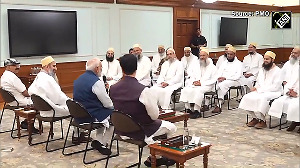The government is likely to provide tax benefits to automobile components and electronics hardware, including telecom equipment, in the Budget. It is also considering sops for the food processing and chemicals industries.
The sectors had been identified as employment generating and growth oriented, where the government intended to provide a special thrust, a finance ministry official told Business Standard.
"These sectors have the potential to contribute to growth but need a certain degree of effort in terms of changes in the tax structure," he added.
Tax benefits for the automobile components sector have also been necessitated by bilateral trade agreements that India is entering into.
In case of electronics hardware, the anomalies of the inverted duty structure because of zero-duty imports of over 200 hardware items from January 1, covered by the Information Technology Agreement, need to be corrected.
Citing the free-trade agreements, the Confederation of Indian Industries has sought a reduction in the import duty of all raw materials used by the automobile components industry from 12.5 per cent to 10 per cent.
The Federation of Indian Chambers of Commerce and Industry has also proposed that Customs duty on raw materials be reduced from 15 to 5 per cent. Lower duty on car air-conditioners has been recommended by both chambers.
Finance Minister P Chidambaram has already announced the simplification of the tax structure for petroleum, man-made fibres, sugar and telecom.
The finance ministry commissioned studies by the National Council for Applied Economic Research and the National Institute of Public Finance and Policy in each of these sectors for the Budget, officials said.
"The objective of the study is to suggest the changes required in the taxation structure, which will maximise results in terms of balancing revenues and social objectives," an official said.
The reports are expected by the end of the month and the revenue department hopes to finalise a detailed list of measures in early February. At present, the revenue department is going through the pre-Budget memorandums submitted by industry associations.
For the food processing sector, Ficci has sought zero duty on capital goods imports. It has also proposed that the special excise duty of 8 per cent on aerated drinks be removed along with the excise duty on instant coffee.
The CII has asked the government to remove the excise duty difference between branded and unbranded food products and reduce the duty on low-value products like cocoa-based confectionery and chewing gum from 16 per cent to 8 per cent.
In the last Budget, the excise duty on branded and packed non-vegetarian preparations was reduced from 16 to 8 per cent.
For the chemicals industry, the CII has recommended the reduction of Customs duty on catalysts and cumene from 15 to 10 per cent.
It has suggested that the Customs duty be halved to 10 per cent for potassium chloride. Besides, a development fund for the modernisation of the industry has also been proposed. Ficci has recommended that Customs duty on technicals and formulations be reduced from 20 per cent to 5 per cent.
Getting ready for D-Day
-
The finance minister has announced the simplification of the tax structure for petroleum, man-made fibres, sugar and telecommunications
-
The ministry has commissioned studies by the National Council of Applied Economic Research, the National Institute of Public Finance and Policy in each of these sectors
-
The objective is to suggest changes required in the taxation structure
-
The revenue department hopes to finalise a detailed list of measures by early February
Sectoral sops
-
Tax benefits for the automobile components sector have partly been necessitated by bilateral trade agreements that India is entering into
- In case of electronics hardware, the anomalies of the inverted duty structure because of zero-duty imports of over 200 hardware items from January 1, covered by the Information Technology Agreement (ITA-I), need to be corrected








 © 2025
© 2025